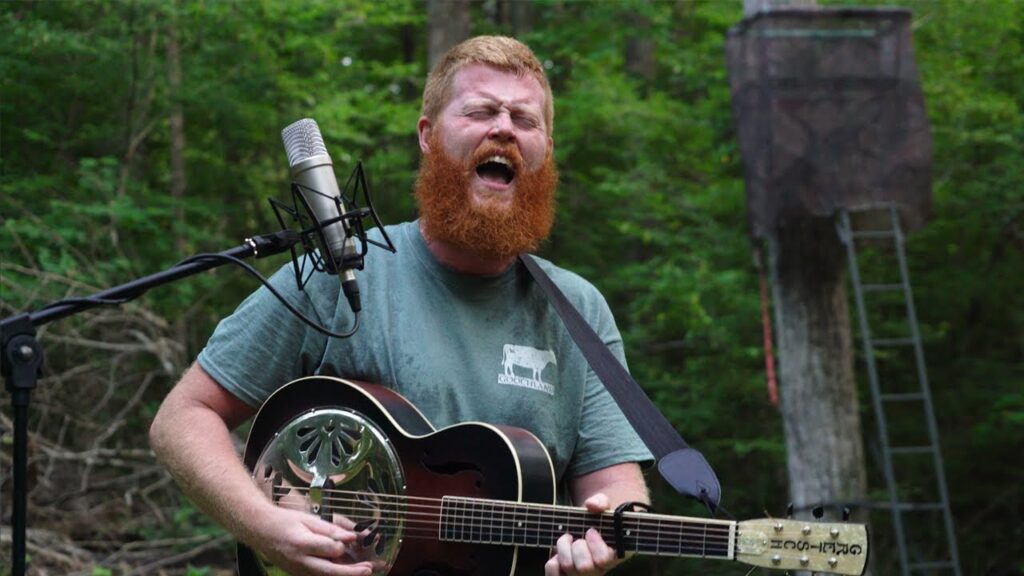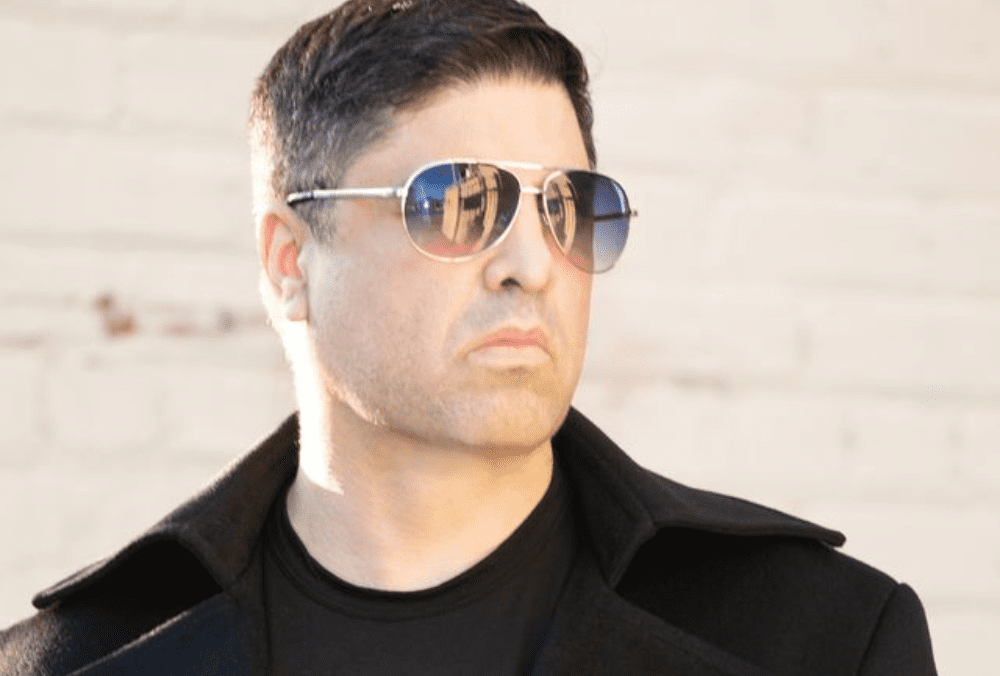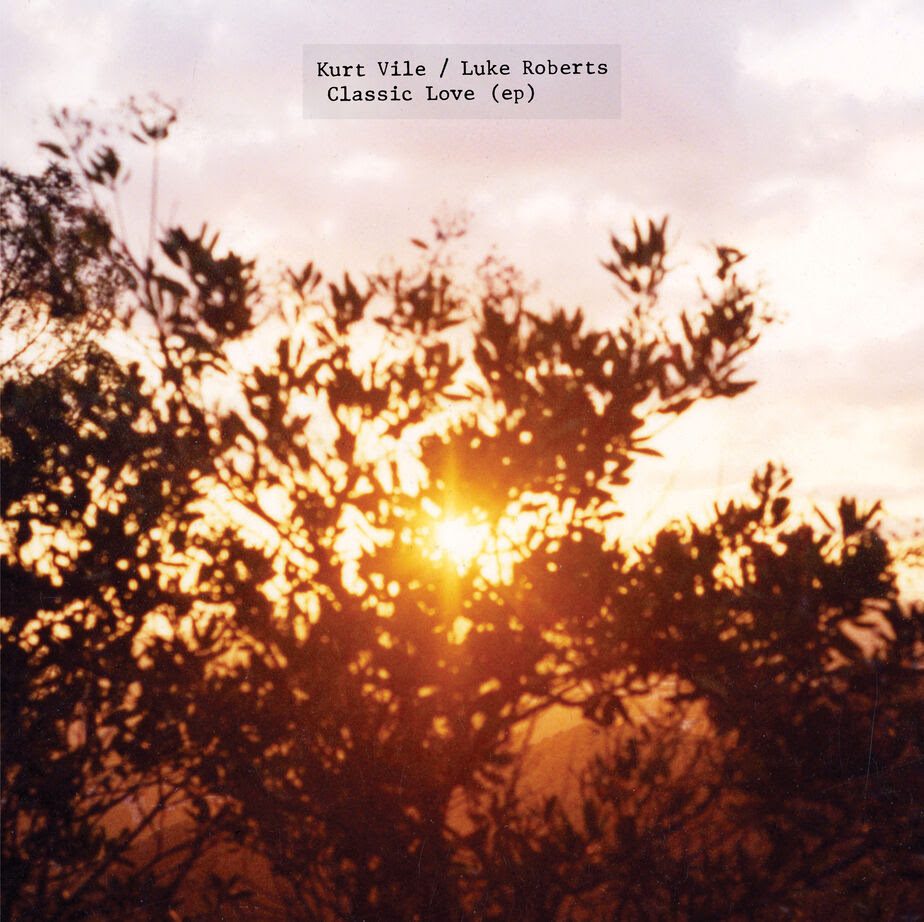
The beard has been inescapable. If you’re on Twitter with any regularity, you’ve probably seen the scrunched-up face of Oliver Anthony, his cheeks blanketed in fuzzy bright red hair. The image is from a professionally filmed performance clip that originated on the YouTube channel radiowv. It finds the former factory worker Anthony clutching his acoustic guitar, performing a solemn country ballad called “Rich Men North Of Richmond” on his plot of land in rural Farmville, Virginia.
In another video posted to his YouTube channel the day before “Rich Men North Of Richmond” debuted, Anthony describes himself as a centrist who believes that “both sides serve the same master, and that master is not someone of any good to the people of this country.” But his song has become a smash hit with conservative culture warriors — from politicians like Marjorie Taylor Greene to media personalities like Matt Walsh to musical artists like John Rich — for reasons that become immediately evident when Anthony starts to sing. The lyrics take aim at Washington bureaucrats who ignore the plight of the working man and “just wanna have total control,” with allusions to the crushing burden of high taxes, politicians’ entanglement with human trafficker Jeffrey Epstein, and fat people who abuse the welfare system.
In some ways Anthony fits into an archetype of grizzled grassroots singer-songwriters that have risen to stardom playing a less glossy, more homespun version of modern country music in recent years. Many have pointed out his physical resemblance to Tyler Childers. Like Zach Bryan, he started out posting lo-fi performance videos recorded on his phone. But those guys have espoused left-leaning views that align them with Jason Isbell and other famously progressive alt-country stars, whereas Anthony is tapping into the same kind of grievance-oriented politics that made Jason Aldean’s “Try That In A Small Town” a rallying point for many on the right. In Anthony, they see their values and their media-fueled anger reflected back — not a common occurrence where these salt-of-the-earth style singer-songwriters are concerned.
The other main difference between Anthony and those other guys is that whereas Bryan and Childers are gifted songwriters, “Rich Men North Of Richmond” is atrocious. Just truly godawful. The song has some intangible soulfulness going for it, but when I finally listened to it after seeing it touted and rebutted for days, I could not believe how clumsy the writing was. There’s none of the storytelling acumen that characterizes so much great country music, no sense of narrative momentum. The part where he nods to human trafficking, an actually terrible problem that has become a weird conspiracy-theorist touchpoint in the QAnon era, is confusing unless you can read the difference between “miners” and “minors” on the page. My you’ve-got-to-be-kidding me breaking point was the lyric punching down at so-called welfare queens: “If you’re 5-foot-3 and you’re 300 pounds/ Taxes ought not to pay for your bags of Fudge Rounds.” Even if you agree with the principle being espoused, imagine soberly uttering those words like you’re Bob Dylan (or praising Anthony as this generation’s Woody Guthrie, like former Mumford & Sons banjo player Winston Marshall did).
But in the game that is the 2020s pop charts, loyalty matters at least as much as quality. Just as pop stans who’ve chosen to build their identity around a certain artist will team up to push their fave’s new song to #1 regardless of whether it’s any good, conservative influencers and their acolytes worked hard to boost “Rich Men North Of Richmond,” and it’s now taken on a life of its own. The song is projected to debut at #1 on the Billboard Hot 100 this week. It’s following the same path up the chart blazed by “Try That In A Small Town,” Aldean’s dogwhistlin’ ode to a particular subset of rural American values. And if Anthony does go all the way to the top, he’ll either prevent one country superstar (Luke Combs) from scoring his first #1 or block another (Morgan Wallen) from an historic 17th week at the summit.
That’s a lot of country hits vying for the top spot in one summer. Country music has crossed over to the pop charts from time to time over the years: Think Jeannie C. Riley’s “Harper Valley P.T.A.” or Lonestar’s “Amazed” or Leann Rimes’ “How Do I Live” or Glen Campbell’s “Rhinestone Cowboy.” From 1973 to 1983, 12 different songs topped both the Hot 100 and the Hot Country Songs chart. But in the 21st century, the genre has mostly made headway into the mainstream by hybridizing with rap (“Over And Over,” “Old Town Road”) or pop (Taylor Swift, Maren Morris). In the mid-2010s, as streaming took over the music industry and the Hot 100 adjusted its formula to include streams as well as airplay and track sales, rap ascended to chart dominance. Hip-hop fans pushed acts like Drake, Migos, Cardi B, and Travis Scott to massive hits, millions of streams at a time. As a genre, country was slower to adapt to the streaming landscape, so the rare crossover hits like Sam Hunt’s “Body Like A Back Road” or Gabby Barrett’s “I Hope” climbed the Hot 100 by building momentum at radio for months and months.
Wallen changed things. In 2020, he was among the first country stars to marshal TikTok’s power, previewing his wistful, easygoing “7 Summers” on the app en route to the kind of big-splash top-10 debut that country singles virtually never see. Following the rap world’s lead, Wallen began releasing marathon albums that sprawled well beyond the confines of a CD, a strategy that can do for an already-popular artist what BALCO did for a born slugger like Barry Bonds. (Unlike steroids in baseball, there are no rules against juicing your streaming totals with a long tracklist.) By early 2021, Wallen had already played SNL, and his behemoth Dangerous: The Double Album was a smash hit. When scandal struck — Wallen was caught on video drunkenly shouting a racial slur in February 2021 — radio stations briefly pulled his music, but his streaming numbers went up as fans reacted to what they perceived as overzealous industry discipline for his behavior. Dangerous spent seven more weeks at #1.
The Wallen saga of 2021 illustrates two parallel phenomena currently driving country songs up the charts. First, the positive part: The genre is spinning off superstars so prolific that one of their songs is bound to catch fire eventually. At a time when label executives are lamenting that pop stars aren’t popping like they used to and rap is subject to endless handwringing about what it means that the genre has stopped yielding crossover hits and household names, country music is lousy with burgeoning powerhouses. There are big economic problems with the streaming model, but it undoubtedly gives listeners more power than radio cartels do. Now that a generation of internet-savvy country stars like Zach Bryan, Lainey Wilson, Jelly Roll, and Bailey Zimmerman has arrived, the genre is gaining a much larger foothold beyond the cordoned-off world of country radio. According to Billboard, country music consumption is up by more than 20% this year.
A large chunk of that influx traces back to Wallen, whose latest data dump One Thing At A Time spent 15 weeks at #1, the most for any album this decade. The project spun off “Last Night,” a catchy but not flashy midtempo lope seasoned with traces of pop and rap, which has thus far logged 16 weeks atop the Hot 100. Three more weeks and it’ll tie the record for most weeks at #1 set by “Old Town Road.” There were times when it seemed like Wallen would be dethroned by Combs, no stranger to massive audiences and ultra-long albums himself, whose uninspired cover of Tracy Chapman’s “Fast Car” has been nipping at the heels of “Last Night” for weeks.
Combs isn’t so different from someone like (noted Morgan Wallen collaborator) Lil Durk, a genre favorite who churns out lots of music and regularly posts solid streaming numbers. There are large segments of the population who have loved both artists, but Durk and his peers have struggled to come up with songs that parlay that goodwill into a hit on the “Fast Car” scale. “All My Life,” Durk’s hokey ballad with J. Cole and a children’s choir, peaked at #2 like “Fast Car,” but it immediately sank out of the top 10 after its big debut. “All My Life” has had a successful run and has even scored some airplay at pop radio, but like Durk’s Wallen collab “Broadway Girls,” it was a naked bid for crossover success, not a distillation of Durk’s ethos in more accessible form. He’s still waiting on his “Bad And Boujee” moment.
“Fast Car,” while benefitting from listener familiarity as a cover of a beloved classic, also presents the Luke Combs experience in miniature: gruff, heartfelt, vulnerable, open-minded, all about the struggle. Similarly, “Last Night” is right there in Wallen’s wheelhouse, from its graceful balance of modernism and tradition to its lyrical focus at the intersection of booze and romance: “Last night we let the liquor talk/ I can’t remember everything we said, but we said it all.” Neither track is great, but both are easy to like, and neither compromises its appeal to the core fan base in pursuit of its pop acumen. Each song has been irrepressible on the charts, though Combs has remained the Cal Naughton to Wallen’s Ricky Bobby. The country song that actually did supplant Wallen for a moment demonstrates the other big subplot behind country’s chart success: campaigns engineered by aggrieved culture warriors.
Jason Aldean’s “Try That In A Small Town” had already been in rotation at country radio for a couple months when its video premiered in July, instantly becoming a cultural flashpoint. Aldean is part of the old guard who’s been churning out country radio hits for years, not some newfangled interloper, though he did once feature Ludacris on his “Dirt Road Anthem” remix. Musically, “Try That In A Small Town” is not his best work — a lumbering ballad that lacks a proper chorus, aiming for gravity and landing on grim — but its lyrics are undoubtedly effective at getting a reaction out of people, especially when paired with Aldean’s chosen visuals. It’s a screed about all the big-city behaviors he dares you to attempt in rural America (carjacking old ladies, spitting at cops, attempting to confiscate guns) at the risk of being beaten senseless, or worse, by some good ol’ boys.
The “Try That In A Small Town” video incorporates footage of protesters confronting police and Aldean performing in front of a courthouse where a lynching once took place, context that led some to interpret the clip as something like a Klan rally without the white sheets. Liberals became aware of the video, got mad online, and amplified Aldean’s reach significantly through hate clicks and quote-tweet dunks. Country music always has its reactionary anthems; this one became a thing because angry left-wingers made it a thing. Though CMT did not provide a reason, ostensibly this backlash is why the network pulled “Try That In A Small Town” from rotation within days of premiering it, a move that of course led to even louder outrage from the class of conservatives Aldean’s song had been pandering to in the first place — people for whom owning the libs is a foundational priority. Suddenly, the culture wars were playing out on the pop charts far more explicitly than they did in the wake of Wallen’s public reproach.
One thing stan armies have proven in recent years is that a large, organized group of people can work together to push just about any song up the charts. Beliebers, Barbz, and the BTS Army alike have used paid downloads to briefly elevate songs to #1 before watching them plummet without corresponding radio and streaming support. Aldean’s supporters launched “Try That In A Small Town” to #2 on the strength of track sales, then matched that effort with streams the following week to secure the top spot. With “Last Night” and “Fast Car” directly behind Aldean, it was an unprecedented moment for country music: the first time the genre had simultaneously occupied #1, #2, and #3 on the Hot 100. Whereas Combs’ and Wallen’s hits persisted, “Try That In A Small Town” fell all the way to #21 the week after its chart triumph. But the statement had been made.
Now Anthony is enjoying his own vitriol-powered viral rise, with people on both sides of the culture wars once again fueling the reciprocal outrage cycle. The numbers suggest “Rich Men North Of Richmond” will beat out “Last Night,” “Fast Car,” former country star Taylor Swift’s “Cruel Summer,” and every other song in America this week. Unlike Aldean, Anthony came out of nowhere. Some have speculated that he’s a so-called “industry plant” whose sudden emergence was the result of an astroturfing campaign masterminded by conservative media elites. He went from zero Twitter followers to over 350,000 in a few days, and he’s backed by a former employee of Glenn Beck’s Blaze Media whose LinkedIn bio brags about spurring “exponential” social media growth. Yet there’s no doubt he’s tapped into a real, pervasive feeling. Maybe he has some help from bots, but you don’t get to #1 at iTunes, Spotify, and Apple Music without some genuine heartfelt support. The excitement around Anthony is genuine; even Gucci Mane wants to sign him.
Country is a genre with a storied history, and contrary to well-worn truisms about its fall-off, it’s still capable of generating great music. Maybe you don’t care for Morgan Wallen or Luke Combs, but there are entire thriving sub-scenes that have traditionally been boxed out by radio programmers — an entire gender, for that matter — who might find their way into the spotlight now that the democratizing power of streaming is coming to bear on the genre. It’s exciting to think that this perennially walled-off wing of the music world could have a chart impact commensurate with its actual popularity, especially if that means a gritty talent like Zach Bryan can follow Wallen and Combs to the top of the charts. It’s a lot less exciting to see the genre’s mainstream resurgence overshadowed by putrid statement songs buoyed by some of this nation’s most toxic patterns of political discourse. Country — and this country — deserves better.



